Occupy Wall Street
- Thread starter #8
- Start date
Looool indeed #8 - did not expect anything more!!
Natural - Chekhe
Boys - I see you in 6 months
Going into self imposed exile. May god bring the best to Iran, America and all the righteous people on earth.
adios
Natural - Chekhe
Boys - I see you in 6 months
Going into self imposed exile. May god bring the best to Iran, America and all the righteous people on earth.
adios
Greek lawmakers pass austerity bill despite riots
ATHENS, Greece (AP) — Ignoring two days of riots outside parliament, Greek lawmakers passed a deeply resented new austerity bill Thursday, caving in to the demands of international creditors in order to avoid a national bankruptcy.
The austerity measures won 154-144 in the 300-member parliament despite dissent from a prominent Socialist lawmaker who voted against a key article of the bill. The vote was expected to pave the way for a vital euro8 billion ($11 billion) payout from creditors within weeks so Greece can stay solvent.
Clouds of tear gas choked central Athens ahead of the vote as riot police intervened to separate rival demonstrators who fought with firebombs and stones outside parliament, leaving one man dead and dozens injured.
The new measures include pay and staff cuts in the civil service as well as pension cuts and tax hikes for all Greeks.
Former Labor Minister Louka Katseli voted against one article that scales back collective bargaining rights for workers. Although she voted in favor of the overall bill, Prime Minister George Papandreou expelled her from the party's parliamentary group, whittling down his parliamentary majority to a bare three seats — down from ten seats two years ago.
Passing the entire bill was "a matter of national responsibility for the critical negotiations that lay ahead in the next few days," Papandreou said in a statement announcing Katseli's expulsion. "The government exhausted every possible effort to incorporate proposals made by members of parliament."
Greece now heads into a series of tough negotiations in Brussels involving the 17 finance ministers of the eurozone and European leaders. The meetings kick off on Friday, when eurozone finance ministers gather, with the finance ministers of the full 27-nation European Union in talks on Saturday, and the EU heads of state and government on Sunday.
Greece has avoid bankruptcy only with an euro110 billion ($152 billion) bailout loan from its 16 eurozone partners and the International Monetary Fund since May of last year. Creditors worried about Greece missing budget targets had demanded that Athens pass extra austerity measures before its gets the next payout. Greece says it will run out of money in mid-November without the next euro8 billion ($11 billion) installment.
In Athens, deputies voted after an acrimonious debate held as rival groups of demonstrators outside fought police and each other in a second day of violence. The protests were held during a 48-hour general strike that brought much of the country to a standstill.
"That it was voted on is one thing. Its implementation is another. The people will tear it apart, they will dismiss it in practice," retiree Kleanthis Kizilis said at the protest.
A 53-year-old protester died of a suspected heart attack and at least 74 were injured in the violence, a local hospital said. Police said at least six people were arrested and another 24 detained, while six officers were injured.
The violence erupted after hundreds of masked anarchist youths attacked a peaceful rally of about 50,000 people in Syntagma Square outside parliament, pelting them with firebombs and jagged chunks of marble. The Communists-backed union members counter-attacked, and chaos ensued as the two sides fought with sticks and rocks before riot police fired volleys of tear gas to separate them.
Running battles ensued through the avenues and side streets of central Athens, with anarchist rioters ripping up paving stones, hewing masonry from buildings and using garbage to set up burning barricades.
The meetings on Greece this weekend are crucial because the efforts so far to get the country back on track financially have been failing. In July, eurozone leaders tentatively agreed to a second euro109 billion ($150 billion) bailout for Greece, conceding that the first was not enough.
That second bailout would also see banks and other private bondholders give Greece easier terms on its debt. European banks that hold Greek bonds are fighting efforts to make them accept larger losses, and many experts are concerned about the ability of European banks to handle a Greek default.
But Greece's international creditors are warning that even the second bailout may not be enough to save the country from bankruptcy, according to a draft of a debt inspectors' report obtained Thursday by The Associated Press in Berlin.
The inspectors said Greece has missed its deficit-cutting targets and called the pace of its reforms insufficient. They still added that Athens should get the next euro8 billion tranche as soon as possible so it does not default.
Papandreou called on Greece's eurozone partners to urgently end a deadlock in negotiations over a broader European debt deal.
"Europe is now at risk because of its inability to grasp the scale of the crisis in time — the systemic problems — and take the necessary decisions," he told an emergency Cabinet meeting in Athens. "Europe must now assume its responsibilities — all of us in Europe. A small fire has become a pan-European fire."
But fury at his government echoed across Athens.
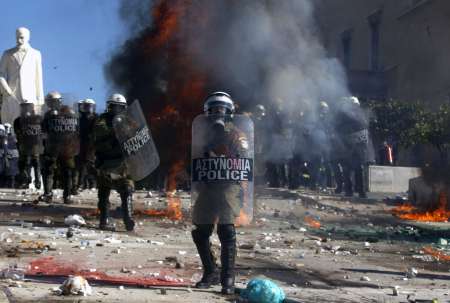

25 of 26 photos
PrevNext
- previous
next

- previous
next

- previous
next
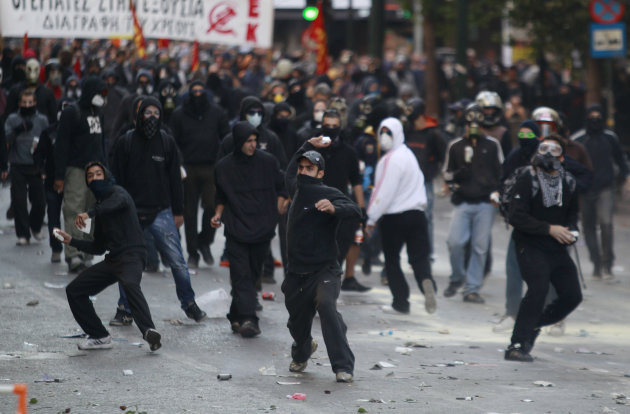
- previous
next
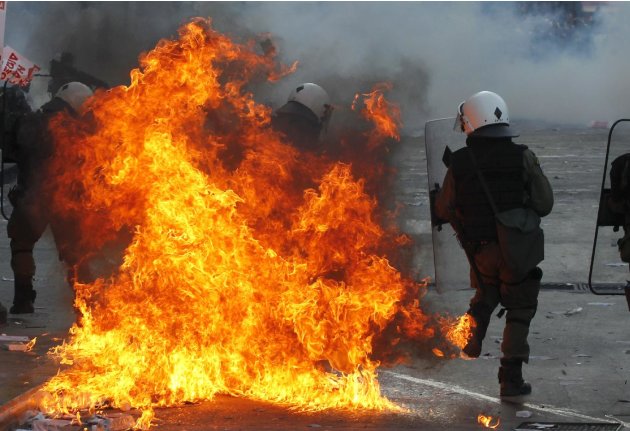
- previous
next
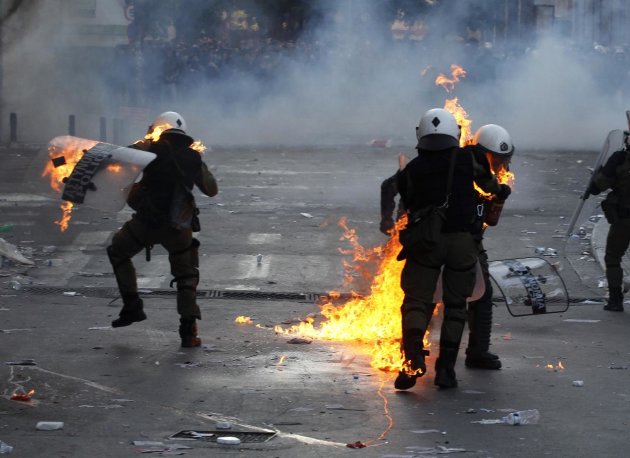
- previous
next

- previous
next
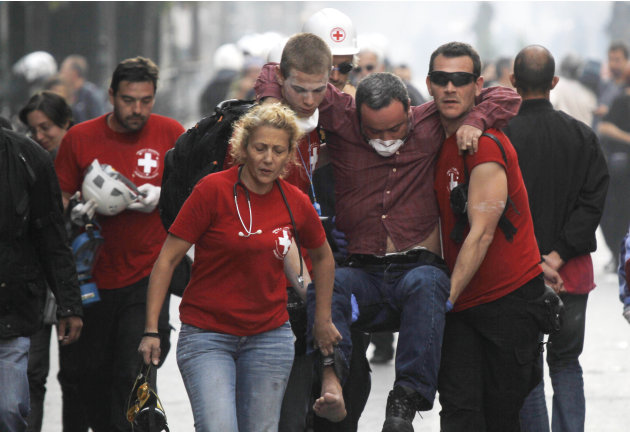
- previous
next

- previous
next

- previous
next
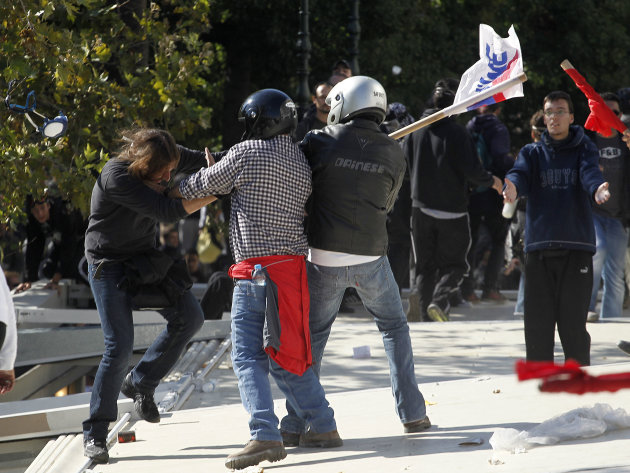
- previous
next
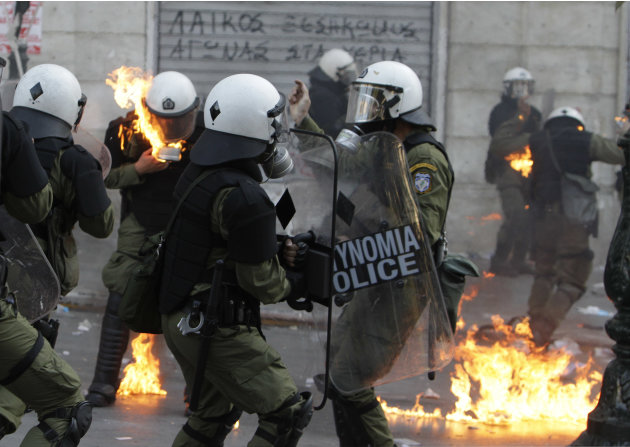
- previous
next
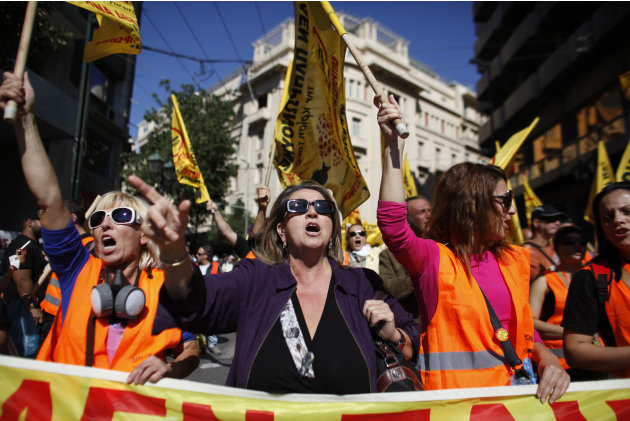
- previous
next
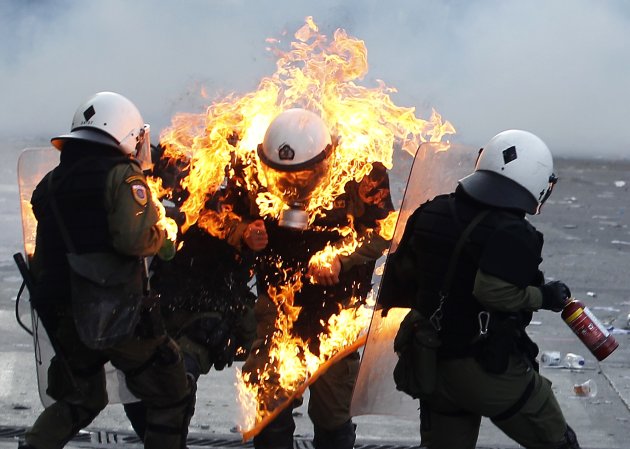
- previous
next
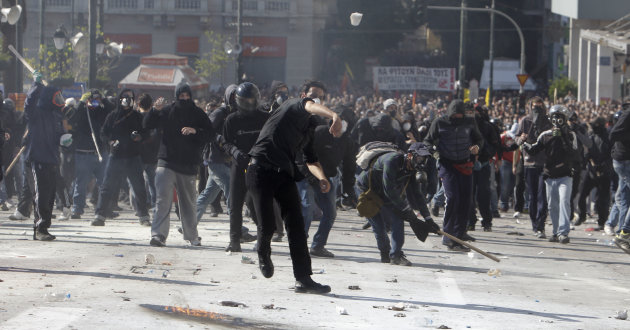
- previous
next
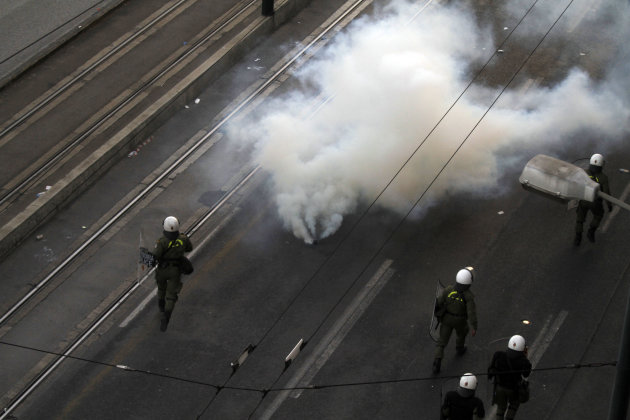
- previous
next
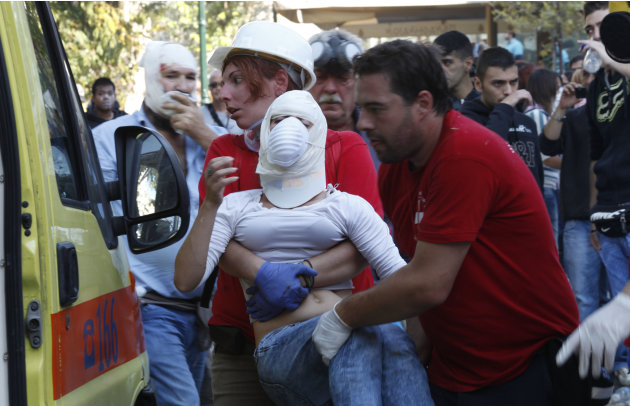
- previous
next
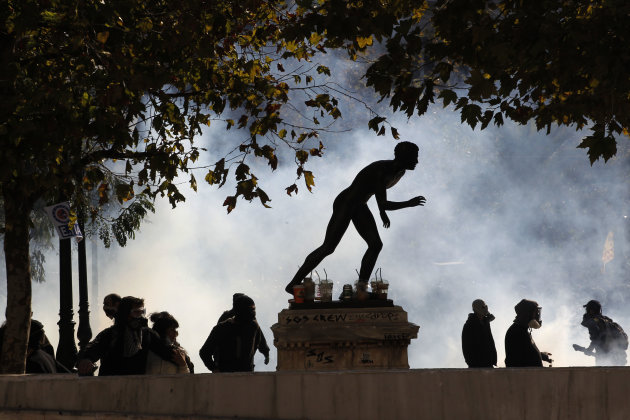
- previous
next
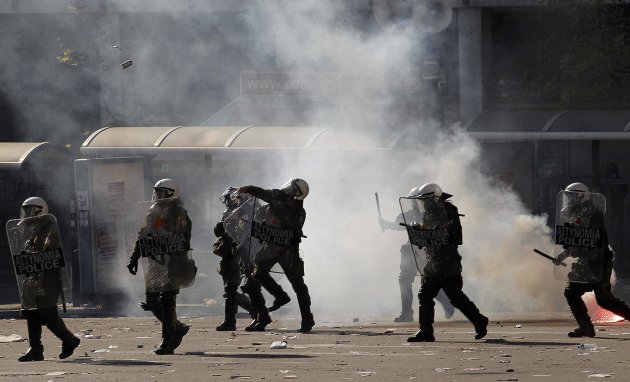
- previous
next
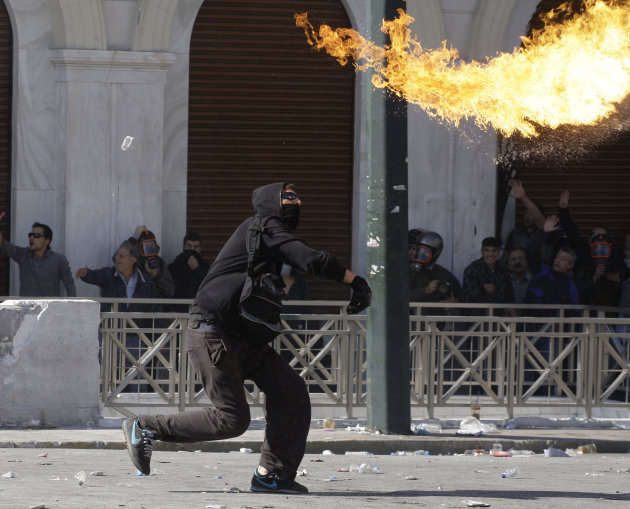
- previous
next
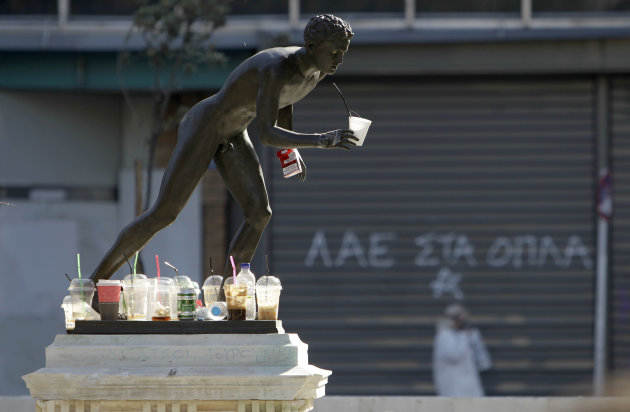
- previous
next
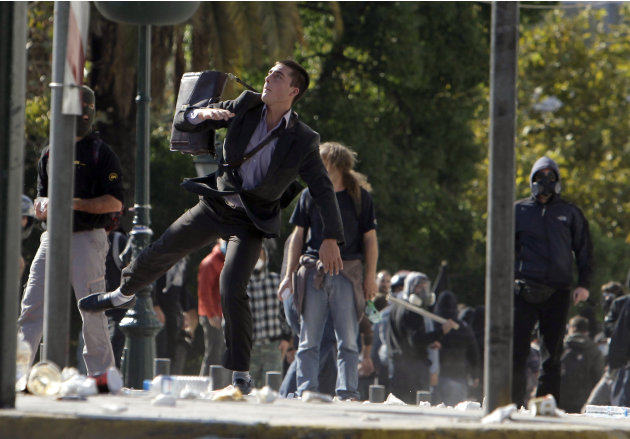
- previous
next
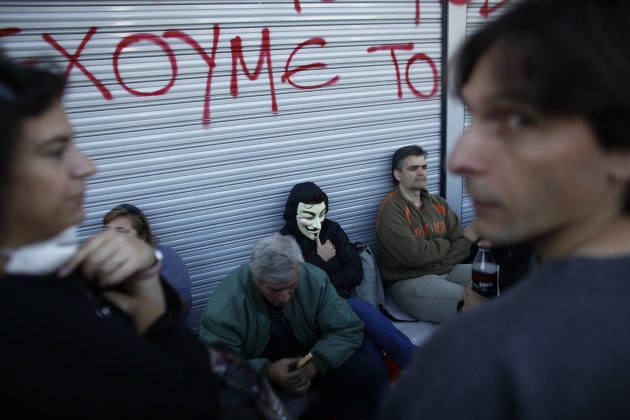
- previous
next
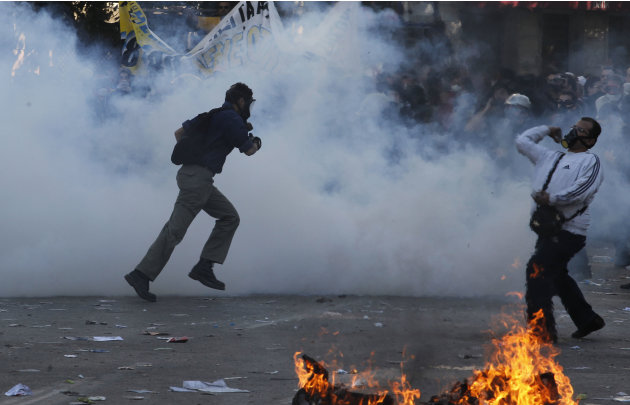
- previous
next
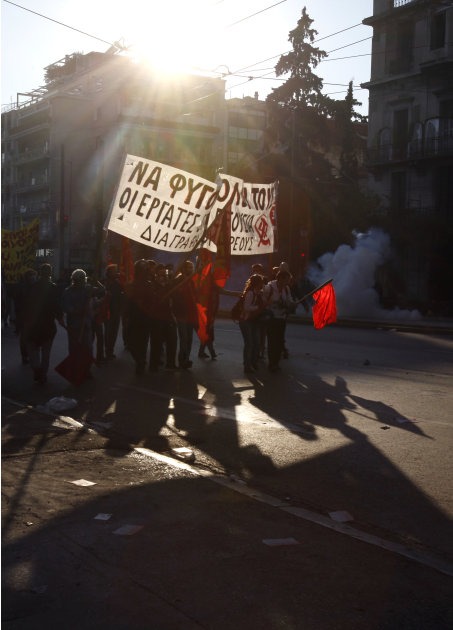
-
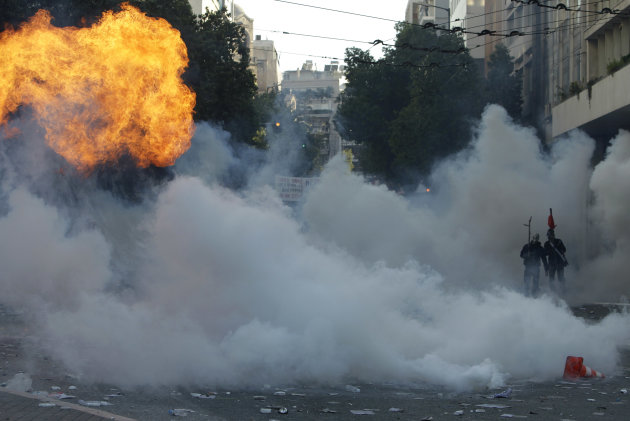
A few FACTS (not opinions coming from your guts) to think about:
The 400 wealthiest Americans have a greater combined net worth than the bottom 150 million Americans.
The top 1 percent of Americans possess more wealth than the entire bottom 90 percent.
In the Bush expansion from 2002 to 2007, 65 percent of economic gains went to the richest 1 percent.
The 400 wealthiest Americans have a greater combined net worth than the bottom 150 million Americans.
The top 1 percent of Americans possess more wealth than the entire bottom 90 percent.
In the Bush expansion from 2002 to 2007, 65 percent of economic gains went to the richest 1 percent.
Tax-free savings accounts give wealthy access to poverty benefit: study

OTTAWA - Wealthy Canadians are getting access to a retirement benefit that was intended for the elderly poor, suggests a new report on the country's retirement-security system.
An actuarial report on the Old Age Security Program for the first time calculates the long-term impact of a popular tax shelter that was created by the Conservative government in 2009.
Tax-free savings accounts, or TFSAs, allow Canadians to save up to $5,000 each year with all earnings and withdrawals exempt from taxation.
TFSAs also come with another big plus: none of the money counts when determining whether the account-holder is entitled to a retirement benefit for low-income seniors.
The Guaranteed Income Supplement currently provides a basic maximum of $665 a month for a single senior, but the amount paid out is reduced or eliminated if the recipient has significant other income.
The official report from chief actuary Jean-Claude Menard, tabled in the summer when Parliament was not sitting, calculates that excluding TFSA money from the means-test for that benefit will cost the federal government an extra $4.2 billion annually by 2050.
That's because as more Canadians see significant growth of wealth inside tax-sheltered TFSAs, they will nevertheless be eligible for the Guaranteed Income Supplement, or GIS.
And rising payouts of the low-income supplement will increase even further if the Tory government eventually raises the annual savings limit to $10,000, as promised in the May 2 election campaign.
"GIS annual expenditures are projected to reach $38.9 billion in 2050, including the effect of TFSAs," says the report.
"This represents an increase of $4.2 billion or 12 per cent in GIS annual expenditures in 2050 compared to projected GIS expenditures without the effect of TFSAs."
Menard's report, due every three years, concludes:
"As investments in TFSAs grow over time and as such, an increasing amount of TFSA-related income is excluded from the determination of program benefits, (GIS) program expenditures will increase as greater numbers of recipients and higher amounts of benefits will result than would otherwise be the case."
Jon Kesselman, a professor in the school of public policy at Vancouver's Simon Fraser University, says an individual saving diligently from age 18 to age 65 could accumulate as much as $1 million in a TFSA account with good investment returns.
Yet, this wealthier individual would still be eligible to collect the low-income supplement — a public-policy contradiction he calls a "looming problem."
Although the drain of GIS money by well-off Canadians is modest now, Kesselman says, it will grow and a future government will likely have to change the rules to ensure those with fat TFSAs are denied the poverty supplement.
"Common sense tells us that at some point in the future, government will change the policy," he said in an interview.
"Better to address this sooner rather than later so that people have honest, accurate expectations about how they're going to be treated. ... I don't see any reason for governments to wait until it's a sizable issue."
Kesselman also says doubling the annual TFSA contribution limit to $10,000, which Prime Minister Stephen Harper pledged to do when Ottawa's books are balanced, will provide "a very disproportionate benefit to higher earners."
That's because middle- and low-income earners are already unable to save enough to take advantage of existing tax shelters, including RRSPs, under the current limits.
The federal government should consider measures to offset the benefits TFSAs provide the rich, including increasing the upper income-tax bracket, Kesselman said.
The Finance Department says its internal 2008 analysis of the impact of TFSAs on the Guaranteed Income Supplement is in line with the numbers in Menard's July report.
Spokesman Jack Aubrey also says the actuarial report shows TFSAs have achieved their main purpose, that is, encouraging everyone — especially low- and modest-income Canadians — to save. And part of their effectiveness is the exclusion of TFSA withdrawals and income from means-testing for GIS benefits.
"Over three-quarters of the benefits of saving in a TFSA (in the first five years) will go to individuals in the two lowest tax brackets," Aubrey said in an email.
An individual can deposit up to $5,000 a year in TFSAs, though there is no income-tax break for doing so, as RRSPs offer.
Rather, the money accumulating inside an TFSA is exempt from taxation and can be withdrawn any time without tax penalty. RRSP funds are also untaxed inside the account, but are subject to tax on withdrawal.
As of Dec. 31 last year, 6.7 million Canadians had TFSA accounts with total assets of almost $43 billion.

OTTAWA - Wealthy Canadians are getting access to a retirement benefit that was intended for the elderly poor, suggests a new report on the country's retirement-security system.
An actuarial report on the Old Age Security Program for the first time calculates the long-term impact of a popular tax shelter that was created by the Conservative government in 2009.
Tax-free savings accounts, or TFSAs, allow Canadians to save up to $5,000 each year with all earnings and withdrawals exempt from taxation.
TFSAs also come with another big plus: none of the money counts when determining whether the account-holder is entitled to a retirement benefit for low-income seniors.
The Guaranteed Income Supplement currently provides a basic maximum of $665 a month for a single senior, but the amount paid out is reduced or eliminated if the recipient has significant other income.
The official report from chief actuary Jean-Claude Menard, tabled in the summer when Parliament was not sitting, calculates that excluding TFSA money from the means-test for that benefit will cost the federal government an extra $4.2 billion annually by 2050.
That's because as more Canadians see significant growth of wealth inside tax-sheltered TFSAs, they will nevertheless be eligible for the Guaranteed Income Supplement, or GIS.
And rising payouts of the low-income supplement will increase even further if the Tory government eventually raises the annual savings limit to $10,000, as promised in the May 2 election campaign.
"GIS annual expenditures are projected to reach $38.9 billion in 2050, including the effect of TFSAs," says the report.
"This represents an increase of $4.2 billion or 12 per cent in GIS annual expenditures in 2050 compared to projected GIS expenditures without the effect of TFSAs."
Menard's report, due every three years, concludes:
"As investments in TFSAs grow over time and as such, an increasing amount of TFSA-related income is excluded from the determination of program benefits, (GIS) program expenditures will increase as greater numbers of recipients and higher amounts of benefits will result than would otherwise be the case."
Jon Kesselman, a professor in the school of public policy at Vancouver's Simon Fraser University, says an individual saving diligently from age 18 to age 65 could accumulate as much as $1 million in a TFSA account with good investment returns.
Yet, this wealthier individual would still be eligible to collect the low-income supplement — a public-policy contradiction he calls a "looming problem."
Although the drain of GIS money by well-off Canadians is modest now, Kesselman says, it will grow and a future government will likely have to change the rules to ensure those with fat TFSAs are denied the poverty supplement.
"Common sense tells us that at some point in the future, government will change the policy," he said in an interview.
"Better to address this sooner rather than later so that people have honest, accurate expectations about how they're going to be treated. ... I don't see any reason for governments to wait until it's a sizable issue."
Kesselman also says doubling the annual TFSA contribution limit to $10,000, which Prime Minister Stephen Harper pledged to do when Ottawa's books are balanced, will provide "a very disproportionate benefit to higher earners."
That's because middle- and low-income earners are already unable to save enough to take advantage of existing tax shelters, including RRSPs, under the current limits.
The federal government should consider measures to offset the benefits TFSAs provide the rich, including increasing the upper income-tax bracket, Kesselman said.
The Finance Department says its internal 2008 analysis of the impact of TFSAs on the Guaranteed Income Supplement is in line with the numbers in Menard's July report.
Spokesman Jack Aubrey also says the actuarial report shows TFSAs have achieved their main purpose, that is, encouraging everyone — especially low- and modest-income Canadians — to save. And part of their effectiveness is the exclusion of TFSA withdrawals and income from means-testing for GIS benefits.
"Over three-quarters of the benefits of saving in a TFSA (in the first five years) will go to individuals in the two lowest tax brackets," Aubrey said in an email.
An individual can deposit up to $5,000 a year in TFSAs, though there is no income-tax break for doing so, as RRSPs offer.
Rather, the money accumulating inside an TFSA is exempt from taxation and can be withdrawn any time without tax penalty. RRSP funds are also untaxed inside the account, but are subject to tax on withdrawal.
As of Dec. 31 last year, 6.7 million Canadians had TFSA accounts with total assets of almost $43 billion.
Occupy Wall Street does have a clear message
A call to recognize the crimes of High Finance
By David O. Friedrichs
SCRANTON, Pa. (MarketWatch) — The Occupy Wall Street protesters in New York City and now in countless other cities and on numerous campuses as well have it right: the current architecture of our political economy is not sustainable, going forward.
The vast economic inequities promoted by Wall Street and the corporate world are immensely harmful to countless millions of people, and to the well-being of our country itself. The financiers whose massively fraudulent activities played a key role in taking our economy over the side of a cliff have not been held accountable for their crimes.
David O. Friedrichs
What are the Occupy Wall Street protesters seeking? Critics of this endeavor claim that there is a lack of a clear focus, agenda and strong leadership. But the overall message of the protesters is crystal clear and hugely important: we all need to become broadly conscious of what is wrong with our present political economy, and we have to promote the political will needed to transform it in fundamental ways.
Will this call for fundamental transformation be successful? If not in the days immediately ahead, it will surely establish a foundation for the inevitable coming together of all the different elements necessary for a fundamental transformation to occur. History is full of surprises, but sooner or later unsustainable political economies collapse, and something new — and in the best case scenario something fairer and far more sustainable — emerges.
Do the activities of the financial sector epitomized by Wall Street have some productive effects? Certainly: They raise financing for corporations and businesses, employ people and pay taxes. But the fundamental problem — well-recognized by the Occupy Wall Street protesters — is that the first and foremost priority of Wall Street is to generate obscene levels of wealth and vastly disproportionate compensation packages for a relatively small cohort of people — the 1%.
Click to Play EU leaders eye guarantees for banksEuropean leaders said at a summit on Sunday in Brussels they are confident that they will find a definitive solution to the European financial crisis but that there is still work to do. Courtesy of Reuters.
The top priority of Wall Street should instead be to foster economic development, high levels of employment across the economy, and a fair and equitable distribution of the commonly produced gross national product for the benefit of the 99%. During the middle of the 20 century, the financial sector more closely approximated these goals. It now has to be fundamentally transformed — admittedly, a tall order — to realize such goals as fully as possible.
As a long-standing student of white-collar crime, I am especially attuned to the dimensions of the Wall Street and the corporate world that operate as a form of organized crime. There are many “criminogenic conditions” on Wall Street, in the language of criminology. The compensation and bonus system that rewards upfront getting transactions and securitizations done, regardless of their long-term viability, promotes pervasive fraud and financial misrepresentation.
Although blame for the financial meltdown climaxing in the fall of 2008 can be cast upon many different parties, there can be no question that massive forms of fraudulent conduct and financial misrepresentations on Wall Street played a central role. We now have a whole shelf full of fine books that have documented this, including the way Wall Street investment bankers awarded themselves obscene compensation and bonuses with grotesquely risky and thoroughly toxic investment innovations.
When the investments inevitably collapsed, the American taxpayers were called upon to bail out the banks, to the tune of hundreds of billions of dollars. None of the key guilty parties have been sent to prison; rather, Wall Street almost immediately called for returning to “business as usual,” has aggressively contested relatively modest new regulatory initiatives, and has altogether done well for itself while much of the balance of the economy and the American people continue to suffer.
We need to recalibrate our criminal justice system to accord a much higher priority to addressing white-collar crime, while maintaining appropriate responses to conventional crime.
There is a vast amount of anger, frustration, and fear among ordinary people across the globe. Young people, including some of my bright, hard-working college students, are justifiably anxious about their ability to pay off their student loans, and about their job prospects and their future overall.
Desperation and a lack of viable alternatives in large part led to the uprisings across North Africa and the Middle East. Here at home, such uprisings have yet to materialize, and populist anger also targets illegal immigrants, unions, bankers and others.
Unless our political leadership recognizes and acts decisively on the compelling need to undertake a fundamental transformation of an unfair political economy into one that meets broad human needs in an equitable fashion, we face a difficult and chaotic future.
David O. Friedrichs is professor of sociology and criminal justice and at the University of Scranton. He is the author of “Trusted Criminals: White Collar Crime in Contemporary Society.”
http://www.marketwatch.com/story/oc...have-a-clear-message-2011-10-24?siteid=YAHOOB
A call to recognize the crimes of High Finance
By David O. Friedrichs
SCRANTON, Pa. (MarketWatch) — The Occupy Wall Street protesters in New York City and now in countless other cities and on numerous campuses as well have it right: the current architecture of our political economy is not sustainable, going forward.
The vast economic inequities promoted by Wall Street and the corporate world are immensely harmful to countless millions of people, and to the well-being of our country itself. The financiers whose massively fraudulent activities played a key role in taking our economy over the side of a cliff have not been held accountable for their crimes.
David O. Friedrichs
What are the Occupy Wall Street protesters seeking? Critics of this endeavor claim that there is a lack of a clear focus, agenda and strong leadership. But the overall message of the protesters is crystal clear and hugely important: we all need to become broadly conscious of what is wrong with our present political economy, and we have to promote the political will needed to transform it in fundamental ways.
Will this call for fundamental transformation be successful? If not in the days immediately ahead, it will surely establish a foundation for the inevitable coming together of all the different elements necessary for a fundamental transformation to occur. History is full of surprises, but sooner or later unsustainable political economies collapse, and something new — and in the best case scenario something fairer and far more sustainable — emerges.
Do the activities of the financial sector epitomized by Wall Street have some productive effects? Certainly: They raise financing for corporations and businesses, employ people and pay taxes. But the fundamental problem — well-recognized by the Occupy Wall Street protesters — is that the first and foremost priority of Wall Street is to generate obscene levels of wealth and vastly disproportionate compensation packages for a relatively small cohort of people — the 1%.
Click to Play EU leaders eye guarantees for banksEuropean leaders said at a summit on Sunday in Brussels they are confident that they will find a definitive solution to the European financial crisis but that there is still work to do. Courtesy of Reuters.
The top priority of Wall Street should instead be to foster economic development, high levels of employment across the economy, and a fair and equitable distribution of the commonly produced gross national product for the benefit of the 99%. During the middle of the 20 century, the financial sector more closely approximated these goals. It now has to be fundamentally transformed — admittedly, a tall order — to realize such goals as fully as possible.
As a long-standing student of white-collar crime, I am especially attuned to the dimensions of the Wall Street and the corporate world that operate as a form of organized crime. There are many “criminogenic conditions” on Wall Street, in the language of criminology. The compensation and bonus system that rewards upfront getting transactions and securitizations done, regardless of their long-term viability, promotes pervasive fraud and financial misrepresentation.
Although blame for the financial meltdown climaxing in the fall of 2008 can be cast upon many different parties, there can be no question that massive forms of fraudulent conduct and financial misrepresentations on Wall Street played a central role. We now have a whole shelf full of fine books that have documented this, including the way Wall Street investment bankers awarded themselves obscene compensation and bonuses with grotesquely risky and thoroughly toxic investment innovations.
When the investments inevitably collapsed, the American taxpayers were called upon to bail out the banks, to the tune of hundreds of billions of dollars. None of the key guilty parties have been sent to prison; rather, Wall Street almost immediately called for returning to “business as usual,” has aggressively contested relatively modest new regulatory initiatives, and has altogether done well for itself while much of the balance of the economy and the American people continue to suffer.
We need to recalibrate our criminal justice system to accord a much higher priority to addressing white-collar crime, while maintaining appropriate responses to conventional crime.
There is a vast amount of anger, frustration, and fear among ordinary people across the globe. Young people, including some of my bright, hard-working college students, are justifiably anxious about their ability to pay off their student loans, and about their job prospects and their future overall.
Desperation and a lack of viable alternatives in large part led to the uprisings across North Africa and the Middle East. Here at home, such uprisings have yet to materialize, and populist anger also targets illegal immigrants, unions, bankers and others.
Unless our political leadership recognizes and acts decisively on the compelling need to undertake a fundamental transformation of an unfair political economy into one that meets broad human needs in an equitable fashion, we face a difficult and chaotic future.
David O. Friedrichs is professor of sociology and criminal justice and at the University of Scranton. He is the author of “Trusted Criminals: White Collar Crime in Contemporary Society.”
http://www.marketwatch.com/story/oc...have-a-clear-message-2011-10-24?siteid=YAHOOB
If one asks any of these "gosfands", what is Wall Street?, not even one can answer it.
I don't want to belabor the point. I am not sure it is beneficial to either of us, but just to set the record straight:
We will just have to agree to disagree. From where I am sitting, I am not misreading anything - my imagination is just not as vivid as yours.
I guess this is where we see things differently. First of all, you called a number of people that disagree with you "galleh" which is commonly referred to domestic stock such as sheep and cows. I can't help but regard this as an insult and it wasn't directed at any one person, but at the whole group of individual that didn't share your view point. I consider this a personal attack and the way I saw it, it came as a result of you coming up short in a logial argument. Second, I didn't attack you at all - I simply called your comments and insults as a childish and irrational reaction to hearing an opposing view. I don't consider this an insult, but just an opinion on your comments, not you personally, where as calling a group of country men and women "galleh" can't be misunderstood - it is an insult. Finally, what you are calling herding, is simply similar schools of thought or having the same view on an issue. It is like me calling all the anti-choice people a herd because they are all saying the same thing. Now, if you want to get a better idea of what a herd is, you might take a good look at the tea party. 
Dear Khorous - In front of every destructive revolution of the past - stood some noble individuals with logical and valid expectations.... As beystr indicated - you are totally misreading what thgis is about and appear fully unaware on the bahind the scenes organization.
when did this become about BT or Nilou - This thread is about OWS.......BT called a point I raised about Keyhan and Shariatmadari as a "Pathetic" attempt to attack OWS.....and I responded to him accordingly. however, you are openly admitting (and somewhat paddling) that your attack on me was a result of seeing me attack (in your mind) some of your favorite members......That is what I call herding. In all modesty, I think the first rule in debates is to follow your mind not your heart. Stick with the issues, and we shall all benefit. I think this issue of herding must be taken very seriously - I take your word for not being affected by mob mentality that exists here......we do have a long wayyyys to go to fix it.....but as you may know the first thing leftists tought the kids of our generation was this very mob mentality.
The chadori women in these photos dont deserve to be called Sheep. They never used nor developed their brains and have intelligent of a cockroach. One can argue while cockroach has some positive contribution in eating dirt, these women have negative contribution and have less value to the universe than cockroaches.
Their behavior worshipping men and getting dominated by them in following Islam and believing their god's only gift to them is being one of the 72 virgins offered to terrorist, a murderer Islamist, or a smelly fat akhoond, in heaven displays how low they value themselves.
Can you expect more from these narrow minded, never developed brains?
Their behavior worshipping men and getting dominated by them in following Islam and believing their god's only gift to them is being one of the 72 virgins offered to terrorist, a murderer Islamist, or a smelly fat akhoond, in heaven displays how low they value themselves.
Can you expect more from these narrow minded, never developed brains?
http://www.vanityfair.com/society/features/2011/05/top-one-percent-201105
This is an article by Stiglitz from May where he basically said it would be a matter of time and further very elaborate and eloquent facts. A must read and in retrospect even better.
This is an article by Stiglitz from May where he basically said it would be a matter of time and further very elaborate and eloquent facts. A must read and in retrospect even better.
October 24, 2011
Destroying the Livelihoods of Thirteen Million People
The Myth of Greek Profligacy
by MARSHALL AUERBACK
Historically, Greeks are very good at constructing myths. The rest of the world? Not so much. Reading the press, one gets the impression of a bunch of lazy Mediterranean scroungers, enjoying one of the highest standards of living in Europe while making the frugal Germans pick up the tab. This is nonsensical propaganda, designing to justify the continued collective execution being inflicted on Athens for the sins of its fathers and grandfathers. As if Greece is the only country ever to cook its books in the European Union! The heart of the problem is in the antiquated revenue system that supports that state, which results in a budget shortfall consistently about 10 per cent of GDP. The top 20 per cent of the income distribution in Greece pay virtually no taxes at all, the product of a corrupt bargain reached during the days of the junta between the military and Greece’s wealthiest plutocrats. No wonder there is a fiscal crisis.
So it’s not a problem of Greek profligates, or an overly generous welfare state, both of which suggest that the standard IMF style remedies being proposed here are bound to fail, as they are doing right now. In fact, given the non-stop austerity being imposed on Athens (which simply has the effect of deflating the economy further and thereby exacerbating the very problem the Greeks are trying to eliminate), the Greeks really are getting close to the point where they should just default and shift the problem back to those imposing the austerity. It can’t be worse than the slow execution they are facing today.
In reality, the Greeks have one of the lowest per capita incomes in Europe (€21,100), much lower than the Eurozone 12 (€27,600) or the German level (€29,400). Further, the Greek social safety nets might seem very generous by US standards but are truly modest compared to the rest of the Europe. On average, for 1998-2007 Greece spent only €3530.47 per capita on social protection benefits–slightly less than Spain’s spending and about €700 more than Portugal’s, which has one of the lowest levels in all of the Eurozone. By contrast, Germany and France spent more than double the Greek level, while the original Eurozone 12 level averaged €6251.78. Even Ireland, which has one of the most neoliberal economies in the euro area, spent more on social protection than the supposedly profligate Greeks.
One would think that if the Greek welfare system was as generous and inefficient as it is usually described, then administrative costs would be higher than that of more disciplined governments such as the German and French. But this is obviously not the case, according to Eurostat. Even spending on pensions, which is the main target of the neoliberals, is lower than in other European countries.
Furthermore, if one looks at total social spending of select Eurozone countries as a per cent of GDP through 2005 (based on OECD statistics), Greece’s spending lagged behind that of all euro countries except for Ireland, and was below the OECD average. Note also that in spite of all the commentary on early retirement in Greece, its spending on old age programs was in line with the spending in Germany and France.
In fact, Greece has one of the most unequal distributions of income in Europe, and a very high level of poverty, as the following table shows. Again, the evidence is not consistent with the picture presented in the media of an overly generous welfare state—unless the comparison is made against the situation in the US.
Of course, these facts don’t matter. The prevailing myth is that Greece is in the words of the FT’s John Authers, “a country that was truly profligate”, with little in the way of data to support that assertion. The country, however, is truly stuck: they can’t devalue, they can’t pay their way, at current prices, and nobody will voluntarily finance them. So they must exit and devalue or drop their domestic prices. The massive default, though inevitable, is just a step along the way.
To make the problem worse, export earnings also seem to face their own structural cap that is consistently exceeded by import spending, which means that the debt that finances the government shortfall is increasingly held abroad. The debt is issued under Greek law, but now it is payable in Euros which Greece is powerless to print. In this sense, ironically, the fiscal crisis is a consequence of Greece’s success, after a long preparation, in joining the European Union, and hence giving up its own currency.
The point is that, if this analysis of the source of the problem is correct, then standard IMF austerity policy is unlikely to do much to help. If the problem is not the level of wages, or the size of the welfare state, then pushing wages down and shrinking the welfare state is not going to do much. Greece, after all, is still a democracy and if one is to judge from the intensifying riots in the country, it is far from clear whether Greece (or any other euro zone member for that matter) is really willing to cut spending and raise taxes rates enough to make a difference. This much is implicitly being conceded by the “Troika” – European Commission (EC), the International Monetary Fund (IMF), and the European Central Bank (ECB), which was submitted to the EU Summit yesterday, and will no doubt be a part of the deliberations in the Greek debt restructuring proposals to be hammered out by Oct. 26th.
On the first page of the document is not only a pretty open and blatant admission that expansionary fiscal consolidation (EFC) has proven to be a contradiction in terms, at least in Greece, but there is also a serious policy incompatibility problem, at least over the intermediate term horizon, with efforts at internal devaluation (ID) – that is, attempting nominal domestic private income deflation in order to improve trade prospects when one has a fixed exchange rate constraint.
While they stop short of recognizing that their demands and the actions they have imposed on Greek policymakers are setting off a debt deflation implosion of the Greek economy (never mind rupturing any semblance of a social contract, and ripping the social fabric to shreds as well – this is, after all, the jackboot version of neoliberal “reform” designed to stamp out any last vestige of social democracy and organized labor in the eurozone) this is a very large concession for the Troika to have taken.
To admit that EFC is not working, and that pursuing ID will aggravate matters further, including the ability of Greece to hit fiscal targets, is a fairly large step in the recognition of the reality of the situation. This is not something the faith based neoliberal economists in the Troika organizations are often prone to do. It is not what their incentive structures, formal and informal, tend to encourage them to do.
So why pursue it? Well, let’s face it: this has far less at this stage to do with Greece (even as the prevailing mainstream myth continues to perpetuate the picture of a lazy, unproductive country full of profligates and scroungers), than punishing other potential fiscal recalcitrants. They are scapegoating the Greeks – in order to make sure that should Greece take the rumored “hair cut” on its debt and restructure, the other peripheral countries – especially Italy – won’t get any ideas and be tempted down the same path. This is the strategy to prevent what is euphemistically called the “contagion impact”. In reality, it is also called the principle of collective guilt, destroying the livelihoods of thirteen million people for political reasons. Given their own history, the Germans above all other nations, should understand this phenomenon.
If the prevailing mix of fiscal austerity policies continue, there will be spill-over effects to nations that export to Greece. To be sure, Greece is a tiny market in Euroland, but its fiscal problems are by no means unique. As the bigger economies like Spain and Italy also adopt austerity measures, the entire continent can find government revenue collapsing – even Germany, where economic deceleration has become markedly more noticeable in the past few months. Worse, exports to neighbors will be hurt by reduction of demand. Finally, if austerity succeeds in lowering wages and prices in one nation it can lead to competitive deflation, only compounding the problem as each country tries to gain advantage in order to promote growth through exports. What is most remarkable to us is that the largest net exporter, Germany, does not appear to recognize that its insistence on fiscal austerity for all of its neighbors will cook its own golden egg-laying goose.
Angela Merkel likes to say that no real economic union is possible if one party to the union (Greece) works shorter hours and takes longer holidays than another (Germany). What she should say is that no real economic union is possible if the governing plutocrats of ALL nations (not just the billionaire Greek shipowners who probably have already moved their money offshore, but also wealthy bankers who have suffered no consequence of their own fraudulent and willfully destructive lending practices) consistently evade their fair share of the cost of that party’s own state expenditure, expecting the union either to pay the bill itself, or to force the bottom 80 per cent to pay it.
Greece is not a special case, but rather a case in point of what happens when you impose fiscal consolidation on countries with high private debt to GDP ratios, high desired private net saving rates, and large, stubborn current account deficits. What is needed is a way to redistribute demand toward the trade deficit nations—for example, by having the trade surplus nations spending euros on direct investment in the trade deficit nations. Germany did this with East Germany. Such a mechanism could be set up under the aegis of the European Investment Bank very quickly. Effective incentives to “recycle” current account surpluses in this manner via foreign direct investment, equity flows, foreign aid, or purchases of imports could be easily crafted. If it could be accomplished, it will be a way Greece and the others could become competitive enough to secure their future through higher exports.
Failure to embrace this kind of growth option will ultimately give the Greeks little alternative but to default, leaving the euro zone’s policy makers with an even bigger and costlier mess on their hands. Admittedly, this will not fully solve Greece’s problems as they would like have to leave the euro zone as well and reintroduce the drachma. This would entail capital controls, which will cause people to head for the exits (this is, after all, a country with lots of boats). If they default, it would be more akin to a “Samson moment” for the entire euro zone. Like Samson in his last days, blinded and beaten by the Philistines, Greece is weakened, blind and bound. Default would represent one last defiant burst of strength with which it “pulls down the temple” (in this case the euro zone) via default and takes down everybody. Myth-making at the expense of the Greeks does not serve anybody’s interests, as there will be a cascade of defaults everywhere, and a Soviet style collapse in incomes, hardly an enticing prospect for the global economy. Not an attractive ending, but this is the kind of outcome which the troika’s self-surviving, immoral and cruel policies could lead to. The Greeks, and the vast majority of Europe’s citizens, deserve better.
MARSHALL AUERBACK is a market analyst and commentator. He is a brainstruster for the Franklin and Eleanor Roosevelt Intitute. He can be reached at MAuer1959@aol.com
http://www.counterpunch.org/2011/10/24/the-myth-of-greek-profligacy/
Destroying the Livelihoods of Thirteen Million People
The Myth of Greek Profligacy
by MARSHALL AUERBACK
Historically, Greeks are very good at constructing myths. The rest of the world? Not so much. Reading the press, one gets the impression of a bunch of lazy Mediterranean scroungers, enjoying one of the highest standards of living in Europe while making the frugal Germans pick up the tab. This is nonsensical propaganda, designing to justify the continued collective execution being inflicted on Athens for the sins of its fathers and grandfathers. As if Greece is the only country ever to cook its books in the European Union! The heart of the problem is in the antiquated revenue system that supports that state, which results in a budget shortfall consistently about 10 per cent of GDP. The top 20 per cent of the income distribution in Greece pay virtually no taxes at all, the product of a corrupt bargain reached during the days of the junta between the military and Greece’s wealthiest plutocrats. No wonder there is a fiscal crisis.
So it’s not a problem of Greek profligates, or an overly generous welfare state, both of which suggest that the standard IMF style remedies being proposed here are bound to fail, as they are doing right now. In fact, given the non-stop austerity being imposed on Athens (which simply has the effect of deflating the economy further and thereby exacerbating the very problem the Greeks are trying to eliminate), the Greeks really are getting close to the point where they should just default and shift the problem back to those imposing the austerity. It can’t be worse than the slow execution they are facing today.
In reality, the Greeks have one of the lowest per capita incomes in Europe (€21,100), much lower than the Eurozone 12 (€27,600) or the German level (€29,400). Further, the Greek social safety nets might seem very generous by US standards but are truly modest compared to the rest of the Europe. On average, for 1998-2007 Greece spent only €3530.47 per capita on social protection benefits–slightly less than Spain’s spending and about €700 more than Portugal’s, which has one of the lowest levels in all of the Eurozone. By contrast, Germany and France spent more than double the Greek level, while the original Eurozone 12 level averaged €6251.78. Even Ireland, which has one of the most neoliberal economies in the euro area, spent more on social protection than the supposedly profligate Greeks.
One would think that if the Greek welfare system was as generous and inefficient as it is usually described, then administrative costs would be higher than that of more disciplined governments such as the German and French. But this is obviously not the case, according to Eurostat. Even spending on pensions, which is the main target of the neoliberals, is lower than in other European countries.
Furthermore, if one looks at total social spending of select Eurozone countries as a per cent of GDP through 2005 (based on OECD statistics), Greece’s spending lagged behind that of all euro countries except for Ireland, and was below the OECD average. Note also that in spite of all the commentary on early retirement in Greece, its spending on old age programs was in line with the spending in Germany and France.
In fact, Greece has one of the most unequal distributions of income in Europe, and a very high level of poverty, as the following table shows. Again, the evidence is not consistent with the picture presented in the media of an overly generous welfare state—unless the comparison is made against the situation in the US.
Of course, these facts don’t matter. The prevailing myth is that Greece is in the words of the FT’s John Authers, “a country that was truly profligate”, with little in the way of data to support that assertion. The country, however, is truly stuck: they can’t devalue, they can’t pay their way, at current prices, and nobody will voluntarily finance them. So they must exit and devalue or drop their domestic prices. The massive default, though inevitable, is just a step along the way.
To make the problem worse, export earnings also seem to face their own structural cap that is consistently exceeded by import spending, which means that the debt that finances the government shortfall is increasingly held abroad. The debt is issued under Greek law, but now it is payable in Euros which Greece is powerless to print. In this sense, ironically, the fiscal crisis is a consequence of Greece’s success, after a long preparation, in joining the European Union, and hence giving up its own currency.
The point is that, if this analysis of the source of the problem is correct, then standard IMF austerity policy is unlikely to do much to help. If the problem is not the level of wages, or the size of the welfare state, then pushing wages down and shrinking the welfare state is not going to do much. Greece, after all, is still a democracy and if one is to judge from the intensifying riots in the country, it is far from clear whether Greece (or any other euro zone member for that matter) is really willing to cut spending and raise taxes rates enough to make a difference. This much is implicitly being conceded by the “Troika” – European Commission (EC), the International Monetary Fund (IMF), and the European Central Bank (ECB), which was submitted to the EU Summit yesterday, and will no doubt be a part of the deliberations in the Greek debt restructuring proposals to be hammered out by Oct. 26th.
On the first page of the document is not only a pretty open and blatant admission that expansionary fiscal consolidation (EFC) has proven to be a contradiction in terms, at least in Greece, but there is also a serious policy incompatibility problem, at least over the intermediate term horizon, with efforts at internal devaluation (ID) – that is, attempting nominal domestic private income deflation in order to improve trade prospects when one has a fixed exchange rate constraint.
While they stop short of recognizing that their demands and the actions they have imposed on Greek policymakers are setting off a debt deflation implosion of the Greek economy (never mind rupturing any semblance of a social contract, and ripping the social fabric to shreds as well – this is, after all, the jackboot version of neoliberal “reform” designed to stamp out any last vestige of social democracy and organized labor in the eurozone) this is a very large concession for the Troika to have taken.
To admit that EFC is not working, and that pursuing ID will aggravate matters further, including the ability of Greece to hit fiscal targets, is a fairly large step in the recognition of the reality of the situation. This is not something the faith based neoliberal economists in the Troika organizations are often prone to do. It is not what their incentive structures, formal and informal, tend to encourage them to do.
So why pursue it? Well, let’s face it: this has far less at this stage to do with Greece (even as the prevailing mainstream myth continues to perpetuate the picture of a lazy, unproductive country full of profligates and scroungers), than punishing other potential fiscal recalcitrants. They are scapegoating the Greeks – in order to make sure that should Greece take the rumored “hair cut” on its debt and restructure, the other peripheral countries – especially Italy – won’t get any ideas and be tempted down the same path. This is the strategy to prevent what is euphemistically called the “contagion impact”. In reality, it is also called the principle of collective guilt, destroying the livelihoods of thirteen million people for political reasons. Given their own history, the Germans above all other nations, should understand this phenomenon.
If the prevailing mix of fiscal austerity policies continue, there will be spill-over effects to nations that export to Greece. To be sure, Greece is a tiny market in Euroland, but its fiscal problems are by no means unique. As the bigger economies like Spain and Italy also adopt austerity measures, the entire continent can find government revenue collapsing – even Germany, where economic deceleration has become markedly more noticeable in the past few months. Worse, exports to neighbors will be hurt by reduction of demand. Finally, if austerity succeeds in lowering wages and prices in one nation it can lead to competitive deflation, only compounding the problem as each country tries to gain advantage in order to promote growth through exports. What is most remarkable to us is that the largest net exporter, Germany, does not appear to recognize that its insistence on fiscal austerity for all of its neighbors will cook its own golden egg-laying goose.
Angela Merkel likes to say that no real economic union is possible if one party to the union (Greece) works shorter hours and takes longer holidays than another (Germany). What she should say is that no real economic union is possible if the governing plutocrats of ALL nations (not just the billionaire Greek shipowners who probably have already moved their money offshore, but also wealthy bankers who have suffered no consequence of their own fraudulent and willfully destructive lending practices) consistently evade their fair share of the cost of that party’s own state expenditure, expecting the union either to pay the bill itself, or to force the bottom 80 per cent to pay it.
Greece is not a special case, but rather a case in point of what happens when you impose fiscal consolidation on countries with high private debt to GDP ratios, high desired private net saving rates, and large, stubborn current account deficits. What is needed is a way to redistribute demand toward the trade deficit nations—for example, by having the trade surplus nations spending euros on direct investment in the trade deficit nations. Germany did this with East Germany. Such a mechanism could be set up under the aegis of the European Investment Bank very quickly. Effective incentives to “recycle” current account surpluses in this manner via foreign direct investment, equity flows, foreign aid, or purchases of imports could be easily crafted. If it could be accomplished, it will be a way Greece and the others could become competitive enough to secure their future through higher exports.
Failure to embrace this kind of growth option will ultimately give the Greeks little alternative but to default, leaving the euro zone’s policy makers with an even bigger and costlier mess on their hands. Admittedly, this will not fully solve Greece’s problems as they would like have to leave the euro zone as well and reintroduce the drachma. This would entail capital controls, which will cause people to head for the exits (this is, after all, a country with lots of boats). If they default, it would be more akin to a “Samson moment” for the entire euro zone. Like Samson in his last days, blinded and beaten by the Philistines, Greece is weakened, blind and bound. Default would represent one last defiant burst of strength with which it “pulls down the temple” (in this case the euro zone) via default and takes down everybody. Myth-making at the expense of the Greeks does not serve anybody’s interests, as there will be a cascade of defaults everywhere, and a Soviet style collapse in incomes, hardly an enticing prospect for the global economy. Not an attractive ending, but this is the kind of outcome which the troika’s self-surviving, immoral and cruel policies could lead to. The Greeks, and the vast majority of Europe’s citizens, deserve better.
MARSHALL AUERBACK is a market analyst and commentator. He is a brainstruster for the Franklin and Eleanor Roosevelt Intitute. He can be reached at MAuer1959@aol.com
http://www.counterpunch.org/2011/10/24/the-myth-of-greek-profligacy/
here's a link and a video by David Icke.(he is all right, may be a little weird some times but right on the money most of the times).
http://www.davidicke.com/headlines/...for-a-wall-street-protestor-and-everyone-else
anyway he is right that ppl should realize (after all these damn decades) that they are slaves and need to get of their lazy a**es and do something about it. enough letting some vultures, leeches/subhuman bastards sucking the life and happiness out of us. meanwhile ppl going out of their way, bending down backward to kiss these mad monsters a**es.
please , you dont have to fight physically, but fight back and dont pay them more than you already do, throw your tv and cable boxes in the trash where they belong to. never buy their books mags and paper...
http://www.davidicke.com/headlines/...for-a-wall-street-protestor-and-everyone-else
anyway he is right that ppl should realize (after all these damn decades) that they are slaves and need to get of their lazy a**es and do something about it. enough letting some vultures, leeches/subhuman bastards sucking the life and happiness out of us. meanwhile ppl going out of their way, bending down backward to kiss these mad monsters a**es.
please , you dont have to fight physically, but fight back and dont pay them more than you already do, throw your tv and cable boxes in the trash where they belong to. never buy their books mags and paper...









